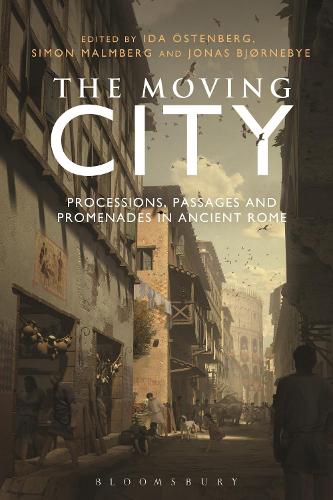
The Moving City: Processions, Passages and Promenades in Ancient Rome
(Paperback)
Available Formats
Publishing Details
The Moving City: Processions, Passages and Promenades in Ancient Rome
By (Author) Ida Ostenberg
Edited by Simon Malmberg
Edited by Jonas Bjrnebye
Bloomsbury Publishing PLC
Bloomsbury Academic
25th August 2016
United Kingdom
Classifications
Tertiary Education
Non Fiction
European history
937
Physical Properties
Paperback
384
Width 154mm, Height 232mm, Spine 24mm
580g
Description
The Moving City: Processions, Passages and Promenades in Ancient Rome focusses on movements in the ancient city of Rome, exploring the interaction between people and monuments. Representing a novel approach to the Roman cityscape and culture, and reflecting the shift away from the traditional study of single monuments into broader analyses of context and space, the volume reveals both how movement adds to our understanding of ancient society, and how the movement of people and goods shaped urban development. Covering a wide range of people, places, sources, and times, the volume includes a survey of Republican, imperial, and late antique movement, triumphal processions of conquering generals, seditious, violent movement of riots and rebellion, religious processions and rituals and the everyday movements of individual strolls or household errands. By way of its longue dure, dense location and the variety of available sources, the city of ancient Rome offers a unique possibility to study movements as expressions of power, ritual, writing, communication, mentalities, trade, and also as a result of a massed populace violent outbreaks and attempts to keep order. The emerging picture is of a bustling, lively society, where cityscape and movements are closely interactive and entwined.
Reviews
In its fashionable focus on societys experience of space [The Moving City] is a product of its time. It is an enjoyable read, successfully presenting a picture of a bustling, lively society, where cityscape and movements are closely interactive and entwined. -- Cora Beth Knowles * Classics For All Reviews *
The monuments of ancient Rome, rooted in time and place, impress us with their calm stolidity. This rich collection of essays successfully reminds us that they were the backdrop to a city in permanent motion from the stately processions of ambassadors and empresses, to the regular ebb and flow of traffic on the Tiber, and to the chaos of a rampaging crowd. -- Bryan Ward-Perkins, University of Oxford, UK
Each paper is both individually valuable and makes a significant contribution to the whole, and the volume itself, cohesive and coherent (as well as all-but-flawlessly edited), will be of interest not only to scholars working in Latin literature and Roman archaeology and social history but also potentially to informed non-specialists eager for further Blue Guide-style tidbits when visiting Rome. -- Jennifer Ferriss-Hill * The Classical Journal Online *
The volume is consistent and well organized: it is surely an important step forward in exploring a more integrated study of the cityscape in the light of the spatial and the performative turns, combining topography, architecture, epigraphy, philology, history and semiotics. It is easy to prophesy that the book will encourage many other scholars to pursue work along these lines, since it clearly shows how fruitful and productive this approach can be. * Bryn Mawr Classical Review *
This thoughtful, well-edited, and well-illustrated collection goes a long ways toward reanimating "the actual lived experience of movement" (176). Anyone interested in the subject of mobility, especially within the ancient Mediterranean world, will find much to think with in this volume, from its engagement with theoretical constructs to literary accounts and constructions to art historical and archaeological analyses. Like a walk around the City of Rome itself, The Moving City provides the reader with many enlightening and often unexpected new vistas on seemingly well-trodden ground. * Classical Journal *
Author Bio
Ida stenberg is Associate Professor of Classical Archaeology and Ancient History at the University of Gothenburg, Sweden. Simon Malmberg is Associate Professor of Classical Archaeology at the University of Bergen, Norway. Jonas Bjrnebye held the Stein Erik Hagen Chair in Cross Disciplinary Studies at the Norwegian Institute in Rome, University of Oslo, Norway, and is now an independent scholar.
